Urban sprawl is a tragedy of the commons
November 4th, 2021
We tend to choose larger homes than we want our neighbors to choose. The result: sprawling development that doesn't match what people actually want from their communities.
People aim to maximize access and space when deciding where to live.
All things equal, most people like living in places with easy access to their day-to-day life. It's nice to be able to walk your kids to kindergarten, and it's easier to keep a social life when many of your friends live on your same street. When you run out of dish soap, you're grateful that you can resupply at the bodega downstairs rather than having to drive 20 minutes to a supermarket.
All things equal, we also want as much space as possible. We like having space for a gym, a separate bedroom for each kid, and a yard where we can relax when the weather is nice. Space also brings us silence, peace, and privacy. On a 10-acre estate, we don't have to hear our neighbors mow the lawn or hush their baby at 2am, and we don't have nosy neighbors wondering why the milkman is lingering so long inside the house.

High population density increases the quantity (and diversity!) of services a neighborhood can support, but it also requires each residence to occupy less land on average.
 |  |
At the extremes, maximizing access looks like Hong Kong, and maximizing space looks like Wyoming. |
But there's a fundamental tradeoff between access and space.
Access to amenities requires a population density that can support those amenities, and space requires... well, it requires space. Clever design can do a lot to reduce this tradeoff, but ultimately more space per person results in fewer people on any given land area.
If we want more amenities closer to us, everything needs to take less space on average. If we want more space, everything needs to be farther away from us on average, reducing our access to those people and services.
Imagine a neighborhood where everyone lives in a 8-story Parisian apartment building. Now, let's move them all to a neighborhood with 1-story single-family homes with 2x the footprint. By an extremely conservative first approximation, everything takes 16x more space, which means points with a similar number of people between them are 4x farther apart. Your friend who lived 15 minutes away now lives 60 minutes away.
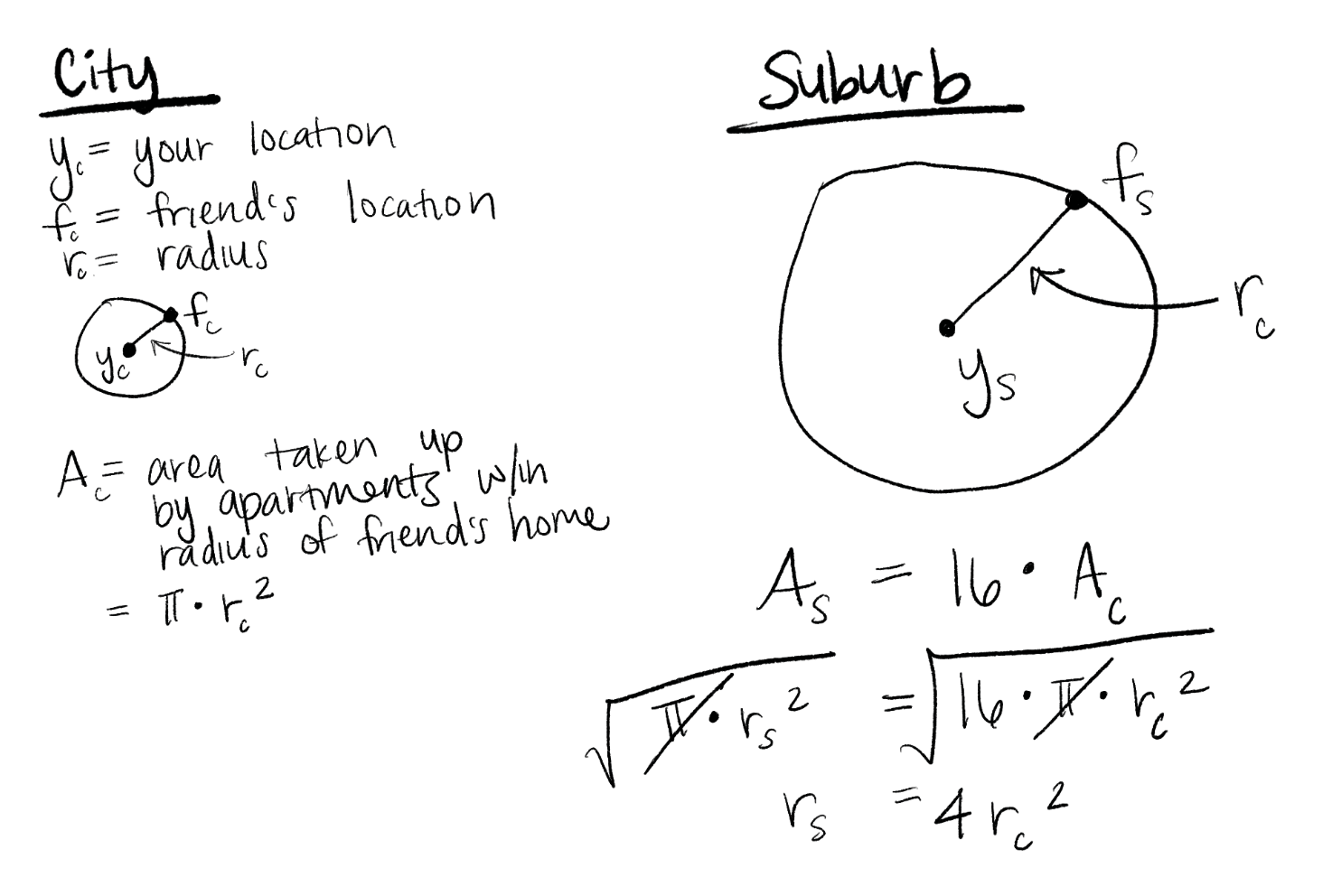
So what? Can't we each just decide how we individually want to balance access and space, move to a community that matches those preferences, and be done with it? If you like having ramen shops open at 2am and I like peaceful morning walks where I don't see another soul for hours, you move to Tokyo and I'll move to Maine. What's the problem?
Your neighbors' housing decisions shape the options available to you.
If you live in a tiny apartment but everyone else chooses a sprawling McMansion, then you get the downsides of a small home with none of the upsides of a vibrant, dense city.
In the extreme case, if every other human on earth decides that they value a yard more than the ability to walk to work, then all neighborhoods will be suburban. If you want to live in a 5-story walkup with a bodega downstairs within walking distance of your job, you're out of luck—those neighborhoods just don't exist.
(Interestingly, this is asymmetric: if everyone else chooses to live in tiny apartments in a city, you could still go to the countryside and live a rural life far away from them.)
Okay, sure. So what? The scenario where everyone prefers a larger space and gives up access to urban amenities isn't realistic. There are plenty of people who prefer city living. Why not just move to a dense neighborhood filled with those people?
Dense neighborhoods are undersupplied, because urban density is a Tragedy of the Commons.
While there are some places where enough people have leaned towards density and access over space and privacy, there is more demand for these neighborhoods than there is supply. Part of the reason for this is because urban density behaves like a classic Tragedy of the Commons.
The aggregation of everyone's preference for more space leads to an undersupply of dense urban neighborhoods. This happens even in cases where everyone in the neighborhood wishes it were more dense and urban!
Let's walk through the game theory. You don't control what your neighbors will do, and there's a spectrum from dense to sparse that any given neighborhood has already collectively chosen. To simplify our model, let's treat these as binary options and just look at the extremes on either end of the spectrum, but keep in mind that there are possibilities in the middle too. These are the two simplified possibilities for how your neighbors might behave:
- Your neighbors all choose to live in small homes that are densely packed with each other, enabling a vibrant urban environment with lots of interesting amenities like parks and restaurants.
- Your neighbors all live in large homes that span multiple acres, enabling them to have maximum privacy, space, and control within their own domain.
Now imagine you don't have control over which of those two neighborhoods you're house hunting in, but you do have a choice between two options of where you will live in that neighborhood, both of which are within your budget:
- A tiny apartment, too small to host a dinner party.
- A luxurious mansion, with plenty of guest bedrooms to host friends.
Everyone I know would choose the luxurious mansion in a heartbeat. Regardless of which path your neighbors take, you're going to do the same thing: you're going to look for the largest, nicest home you can find that falls within your budget.
This is called a Nash equilibrium, a fancy way of saying that you're going to choose the same strategy regardless of how your neighbors behave around you. If everyone else lives in a small space to maximize the population density of a neighborhood, you can free ride on that and choose a bigger home to get the benefits of both more space and access to the amenities enabled by density.
Let's model this in a game theory matrix:
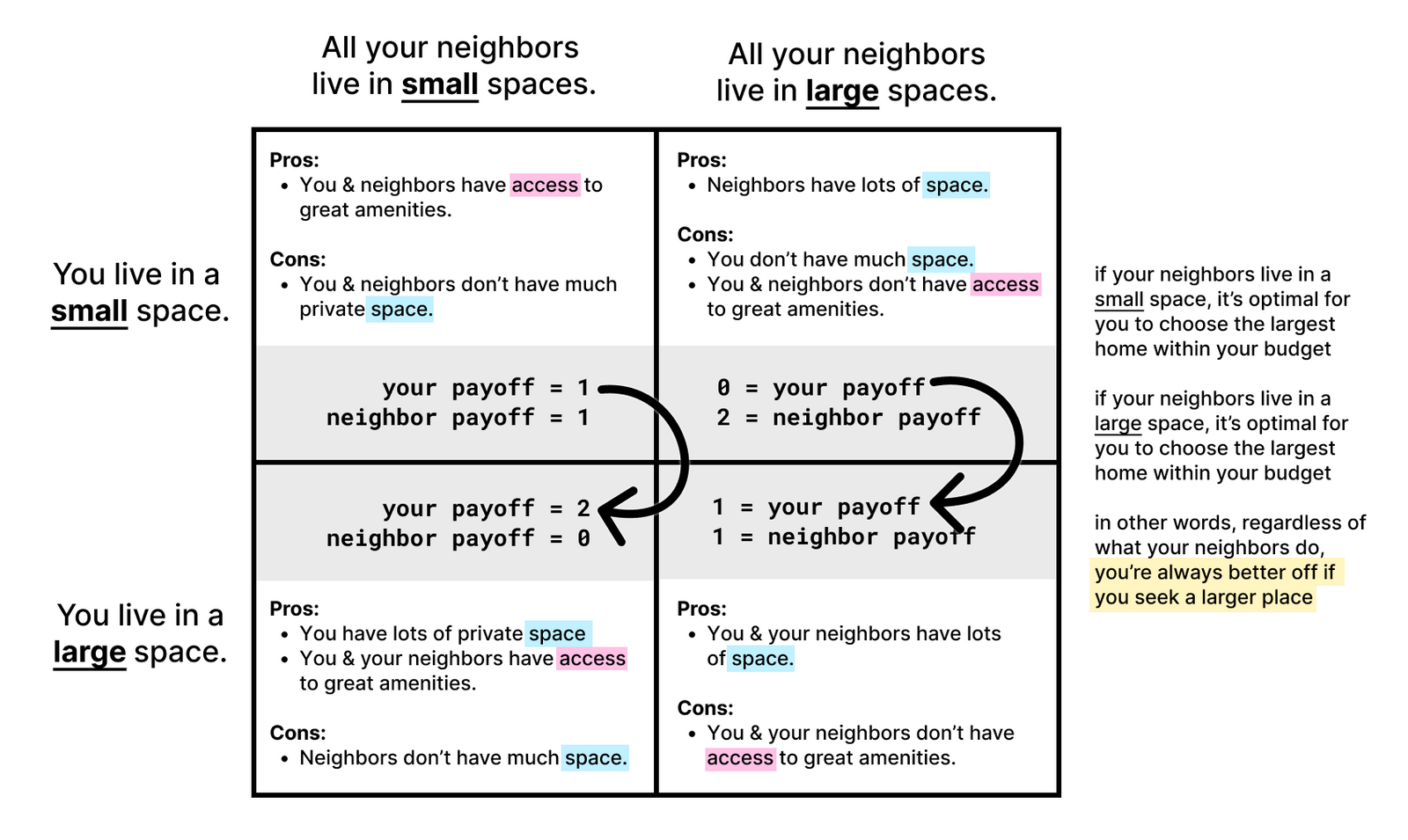
But if every home in a city was a mansion, it wouldn't be a city anymore; it would be a suburb.
When one household chooses a larger home, it doesn't have a noticeable effect. But if we apply this logic to every person who lives in a city, the effect is a huge expansion of the city's footprint, pushing the market towards larger homes on average. In turn, this makes neighborhood populations more sparse.
Put another way, each of us tends to choose a larger homes than we want our neighbors to choose. Of course most people can't afford a mansion, but they will always want as much space as they can get. Financial constraints keep this dynamic from spiraling out of control, but at the margin there's constant pressure towards sprawl.
The result: an undersupply of urban neighborhoods.
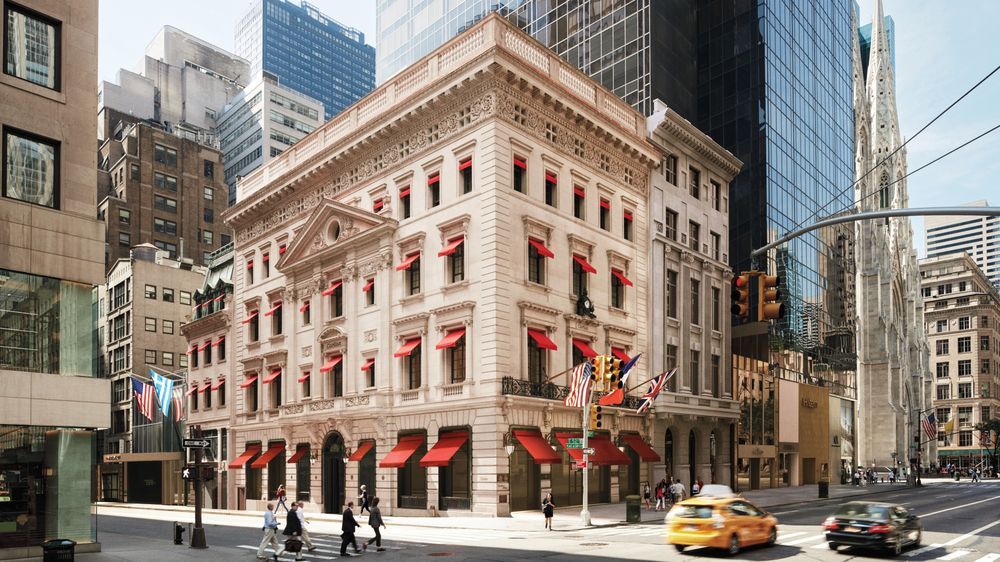
If every New Yorker lived in an enormous private home like the Cartier Mansion, it wouldn't be a city anymore; it would be a suburb.
The good/bad news is we're far from the efficient frontier of the access vs space tradeoff.
Most cities currently make terrible use of space, causing people to be more spread out than they need to be, even when taking into account our general preference for more private space. This is bad news to the extent that we're wasting a lot of space unnecessarily right now, but in a way it's also good news: there's plenty for us to do to improve it!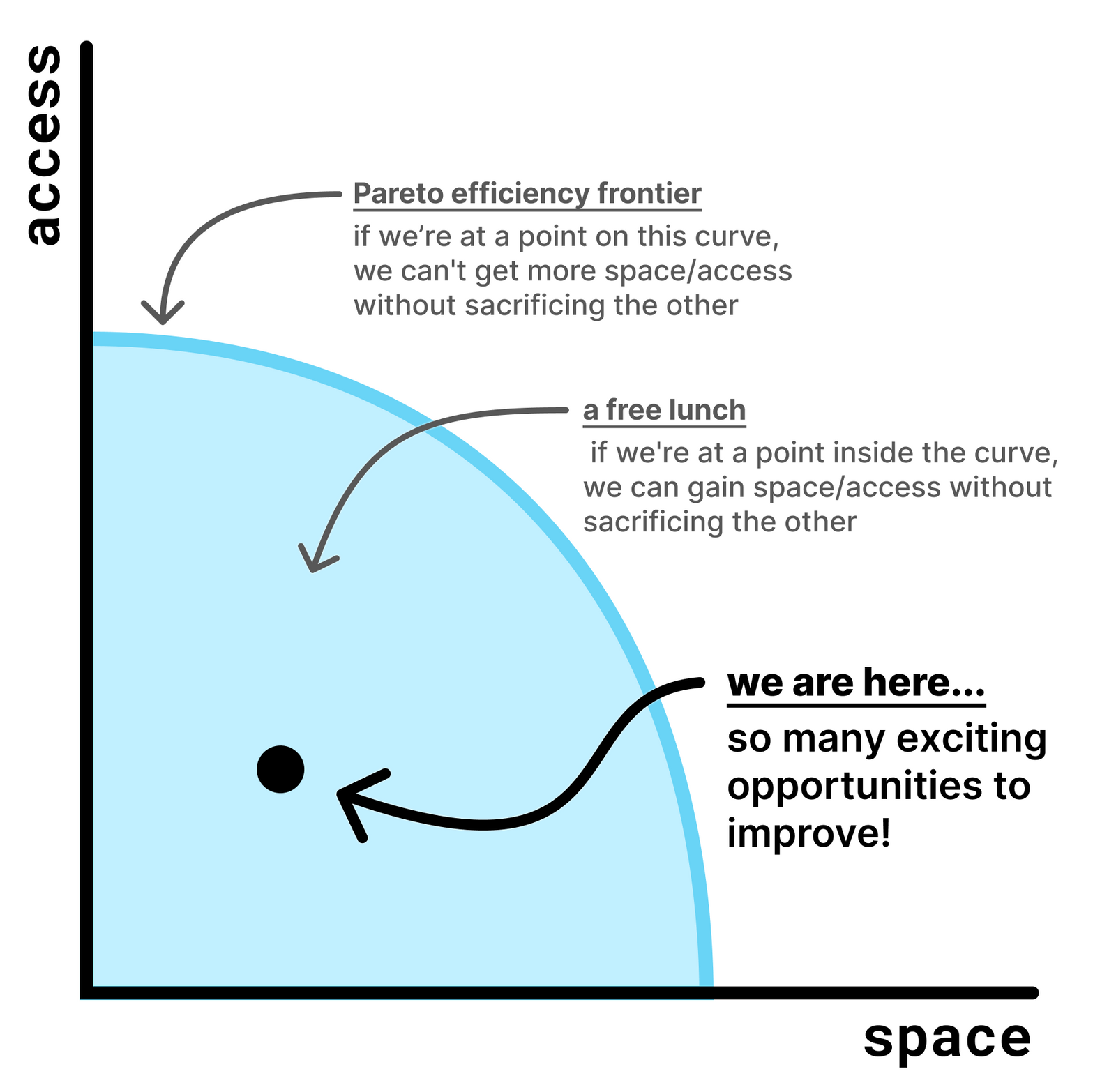

There are so many ways we could increase access to amazing things without sacrificing space. A full list of these ideas warrants a post all of its own, but I'll share three examples that jump to mind:
- Most cities in the US have parking minimums for buildings, including apartment developments targeting residents who don't own a car. This results in lots of extra parking spaces that spread out our cities and make it harder for us to reach each other. (There are 3.3 spaces per vehicle in LA County, for example.)
- Many coastal cities put highways right on the waterfront, blocking access to the ocean. This is some of the most coveted real estate in any city, and people in cars barely appreciate the view and ocean air anyways! Instead, make a long thin park along the entire waterfront, and make it the backyard of the first row of buildings. Then, put the first road on inside of that first row of buildings to protect park-goers from the car noise.
- If we replaced all on-street parking with more spaces in parking garages, we would have a lot more public land on the street. This wouldn't even have to sacrifice the absolute number of parking spaces! Just take advantage of vertical space by stacking them in a parking garage. The street space this saves could be used in so many ways. It could be turned into wider bike lanes, linear parks that line all of our streets with flowers, or literally anything else besides car storage.
There is so much low-hanging fruit to use the space in our cities better, even before trying to tackle the broader coordination problem. I find it reassuring to know that although this tragedy of the commons will be hard to solve, there's plenty we can do before we have to face that final boss.
What would you add to the list?
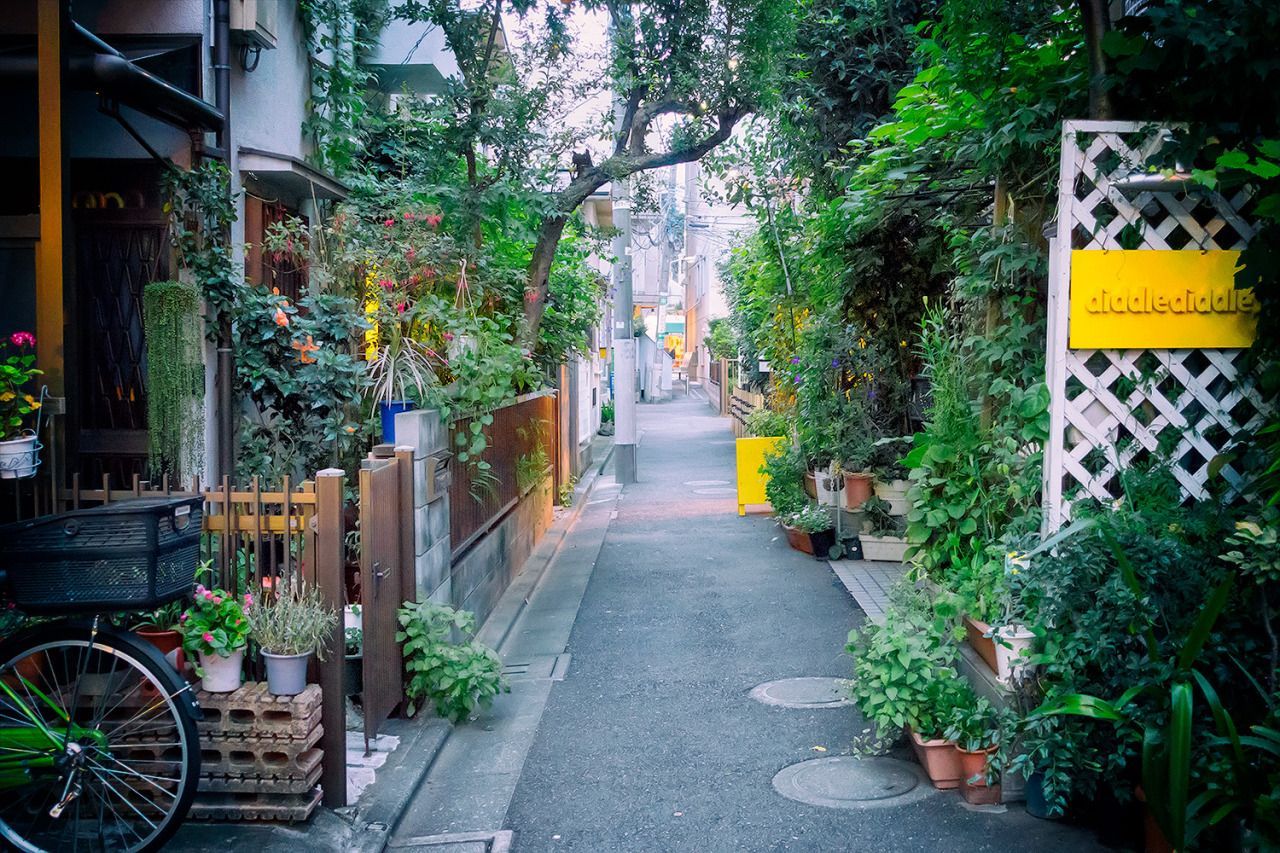
Tokyo does not provide public, on-street parking. Drivers are responsible for finding private storage for their cars, just like any other private possession. The result is lovely, and I'd love to see more cities adopt this policy!
Keep in touch!